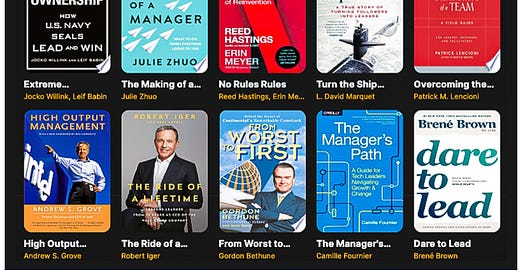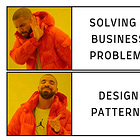Seriously, you won’t regret reading those books!
For a convenient and visual way to access this list (with my comments!), I created it on BookWiz for you.
Although I insist you should fully read them, I summarized my main takeaway from each book in today’s article:
Turn the Ship Around: building a team that doesn’t depend on you.
No Rules Rules: removing all controls and bureaucracy.
Extreme Ownership: YOU are the organization.
High Output Management: how to choose your own tasks.
From Worst to First: the importance of connecting your team to the business.
The Making of a Manager: understanding what are you measured on.
The Manager’s Path: the skill of being managed.
The 5 Dysfunctions of a Team: how to build a great team with your peers.
The Ride of a Lifetime: the advantages of toughing it out.
Dare to Lead: why you should be vulnerable in the workplace.
Alright, here we go.
1. Turn the Ship Around
by L. David Marquet, 2013
Let’s say you have just finished 3 years in your role as a team leader, and moved on to another company. After a couple of months, you hear from friends that everyone is depressed, and your past team is doing awful. What would you feel?
Would you be secretly delighted?
And if 3 months have gone by, and the team is doing even better without you. How does it make you feel now?
Are you a bit upset?
While I've been told "a good leader is measured in his absence", I just can’t make it work in practice - I like to be missed.
Marquet shows us how we have a completely screwed-up leadership model, that is based on the personality of the leader, and the performance while the leader is present.
He shows how rare is that:
People are measured/rewarded for what happens in the organization after they leave.
When an organization is doing worse immediately after a leader leaves, that leader is held accountable (and not praised/missed).
The book covers an alternative leadership model - the leader-leader one (versus the common leader-follower).
Useful takeaway
It’s actually simple - you just shouldn’t be the one making most decisions.
Share with the team your decision-making process, and expect them to be owners of their part. When a team member finds a technical debt she wants to fix, expect her to come prepared. "I found we have this small memory leak in service X, here's the ticket with the details, I plan to fix it during the next sprint."
2. No Rules Rules
by Erin Meyer and Reed Hastings, 2020
Netflix has a unique culture, built in 3 parts:
High Talent Density - they hire top performers, pay top of the market, and fire fast.
Candor - they encourage loads of feedback, and are fully transparent with all employees.
No controls - they have no vacation/travel/expense policies, released decision-making approvals, and lead with context and not control.
People are trusted to use company expenses as they see fit, work as they see fit, and have the best interest of the company at heart.
Useful takeaway
My main one was the keeper test - Netflix tells you to imagine an employee telling you they want to quit. If you don’t think you’ll fight very hard to keep them - it means they should be already fired.
For most of us, it’s more complex than that, I covered my thoughts about it in You Are Firing People Too Late.
3. Extreme Ownership
by Jocko Willink and Leif Babin, 2015
It’s human nature to blame others for problems. The ‘organization’ sucks, the ‘management’ is to blame. Well, if you are in a leadership role (Staff/Principal engineers included) - YOU are the company, and there is much you can do.
In each of the 12 chapters, the authors share business (and military) stories of principals you can apply in your work.
Useful takeaways:
Extreme ownership - As a leader, you should take the blame. For everything. People respect that. In 99% of the cases, you could have done something better to prevent the problem.
There is no bad team, only bad leaders - The authors share a story on how underperforming and excellent teams got their leaders switched. Guess what - the leader DOES matter.
Believe VS disagree - ask questions about instructions you don’t agree with. DON’T just disagree and commit. If you respect the people at the top, make sure you believe in the mission, and focus on that.
4. High Output Management
By Andy Grove, 1983
This sentence summarizes Grove’s (Intel’s legendary CEO) view on management: The output of a manager is the output of the organizational units under his or her supervision or influence.
So how do you increase the output of your team?
To answer the question, he introduces the concept of leader leverage - the impact anything you do has on the output of your team.
High leader productivity depends on choosing to perform tasks that have higher leverage.
Useful takeaway
Whether you are an IC or a manager - thinking in terms of leverage can transform your career. How does what you do now, help improve the productivity of the whole team?
Here’s an example: code too much, and you don’t improve the team. Code too little, and you lose touch, which can also hurt the long-term productivity of the team.
5. From Worst to First
by Gordon M. Bethune and Scott Huler, 1998
The single best way to improve the bottom line result of your company is to connect your employees to the business side, help them understand it, care about it, and benefit from it.
The book tells the story of how Bethune transformed Continental Airlines - from the worst and always-late airline in the US to one of the best.
Continental's planes were always late, so the company had to pay $5M in fines each month. Bethune told the employees - let's improve that metric together, and share the profit.
For every month that Continental was in the top 3 airlines on being on time - ALL employees got a $65 bonus.
It worked like magic.
Useful takeaway
Bethune also got a professional pilot’s license, to be able to have better conversations with the pilots in the airline. This inspired me to get a professional drone pilot certification, and convinced me why good managers must be business-oriented:
6. The Making of a Manager
by
, 2019 (she also has a great newsletter - )If you are a first-time manager - start with this book. It covers everything you need to know to get started.
A small taste of the great stuff inside:
[Sharing the framework of her manager]: Half of what he looked at was my team’s results—did we achieve our aspirations in creating valuable, easy-to-use, and well-crafted design work?
The other half was based on the strength and satisfaction of my team—did I do a good job hiring and developing individuals, and was my team happy and working well together?
The first criterion looks at our team’s present outcomes; the second criterion asks whether we’re set up for great outcomes in the future.”
Useful takeaway
I’ll go with another great quote, this time on 1:1 meetings:
“…My friend Mark Rabkin shared a tip with me that I love: strive for all your one-on-one meetings to feel a little awkward. Why? Because the most important and meaningful conversations have that characteristic.”
7. The Manager’s Path
by Camille Fournier, 2017
While this amazing book covers the whole journey from engineer to VP R&D (with a ton of useful advice for each role!), I’ll focus on the advice Fournier gives on How to be managed.
She shares 3 main tips:
Expect regular one-on-ones, ask for them if needed. Prepare an agenda, and guide your manager to where you need her most.
Give your manager a break. The manager's job is not to make you happy all the time, but to do what's best for the company and the team. Your relationship with your boss is like any other relationship - the only person you can really change is yourself.
Choose your manager wisely when switching jobs. He may have a huge effect on your career. As often said - people leave managers, not jobs.
8. The 5 Dysfunctions of a Team
by Patrick Lencioni, 2002
That's the book that started the trend of business books for me. In a little over 200 pages, Lencioni tells the story of Kathryn, a newly appointed CEO who needs to turn a group of headstrong executives into a highly functioning team, to save the company.
Through Kathryn's story, Lencioni demonstrates the 5 dysfunctions of bad teams, and how to overcome them:
Absence of trust.
Fear of conflict.
Lack of commitment.
Avoidance of team accountability.
Inattention to team objectives.
In the end, there are even questionnaires you can use to check to see how good your team is!
Useful takeaway
A lot of managers think 'nice, but my team is working perfectly' without understanding how much can be improved.
What hit me the most, is how many non-functioning teams I had in my previous organization. As team leader, I only looked downwards. If someone asks a team leader who is on their team, they will almost always start counting the employees under them.
But if we go from the top of the pyramid down, a strange picture emerges:
The CEO's team is the executives.
Each executive's team is with his subordinates - e.g. the VP R&D's team is the team leaders.
Each team leader's team is his developers.
The only team where everyone is totally on board is usually the development team. There is immense value in building an amazing team with your peers.
9. The Ride of a Lifetime
by Robert Iger, 2019
I read this book during a tough period I had a year back, and it heavily influenced my decision to stay in the company. I’ve shared here what I learned from almost quitting 3 times:
Bob Iger worked his way up the ranks at Disney for 46 years, until he became the CEO. In the book, he shares his insights on the importance of "pragmatic enthusiasm" when it comes to our careers. He explains that even in the face of difficult choices and less-than-ideal outcomes, you must stay optimistic.
Useful takeaway
We all have our ups and downs, and sometimes we DO need to switch jobs. But there are benefits to "toughing it out".
Deeper professional understanding of the industry and organization.
Strong relationships, which can lead to new opportunities down the road.
Promotions - the team leader → Director promotion is almost always internal.
10. Dare to Lead
by Brené Brown, 2018
When you imagine a great leader, is it someone who always knows what to do, never shows weakness, and leads in confidence?
This is how I try to lead, as I always felt it’s the best way to inspire my team.
Brené Brown doesn’t agree. She claims that being open and vulnerable is a strength in leaders, not something to hide.
Brown has done a lot of research and found that the best leaders are the ones who are brave enough to admit not having all the answers and talk about the tough stuff.
Useful Takeaway
Brown’s big idea is that being open and sometimes unsure doesn’t make you a bad leader - it makes you a real one. when you are “being real” with your team, you allow them to do the same - creating a more connected (and creative!) workplace.
Awesome books, but what’s next?
Books are great, and I truly think that if you apply all of the advice in those 10 books, you will be an AMAZING leader. That’s going to be very hard though…
In my opinion, learning from other engineering leaders is the best way to actually implement changes. I try to share my honest struggles in this newsletter, and there are other engineering managers who do the same.
Here are the TOP 10 newsletters written for engineering managers, by engineering managers:
1. by
Among the list, James has the most experience in writing for engineering managers - he even wrote the book Become an Effective Software Engineering Manager. (It’s high in my backlog, I won’t be surprised if it’ll displace another book in the top 10 list).
This one I enjoyed the most: The problem with your manager is… you.
2. by
Gregor’s is the fastest-growing newsletter for engineering managers, which says a lot :) His writing is concise and always interesting.
The recent “From a tech lead to a team lead”, told
’s story, is a great one to start from!3. by
Daniela has a unique perspective on managing people from multiple cultures (she now manages people from 7 different countries!), and great ideas on how to deal with the related difficulties.
I especially loved: Having Fun and Boosting the Feedback Culture in Your Team
4. by
Michal has a unique voice, a bit more on the philosophical side, and very thought-provoking. He shares interesting mental models you can use - I really enjoyed The inversion mental model article.
5. by
Jiovanni is in his first role as a manager, and shares honest thoughts and struggles from the journey. His latest How I stay motivated as an engineering manager is a great read.
6. by
Nicola is SUPER thorough - his articles are always very comprehensive, and cover the topics from every angle (and include superb visuals!).
The latest one is very useful: Developing Essential Soft Skills for Engineers and Leaders
7. by
I feel that Ryan’s is the most honest and raw writing - sharing everything as it is. Sometimes I ‘polish’ my writing too much, and he inspires me to be more authentic.
This one resonated with me: The 5 stages of a software’s team lifecycle.
8. by
Raviraj started just 7 months ago, but grew like crazy (15K subs!), thanks to his amazing improvement. This one is not aimed directly at engineering managers, but as a Staff Engineer and Tech Lead in Meta, I find ALL of his posts useful.
This one is very insightful: 5 Non-Verbal Behaviors Killing Team Health
9. by
Matt basically done it all - sold a company, built a business, and now is the CEO of his company. He has 20+ years of experience as a tech leader, and it shows in the high-quality content.
As a manager in a startup, I found this one very practical: When should you do QA?
10. by
Coltin is a new addition to the writing-EMs world - his articles are a combination of great quotes, tips, articles, and podcasts he listens to. I’ve found many useful nuggets there!
Checkout: Lead Kindly by Managing Your Energy
Anything I missed?
I’m always happy to receive recommendations for good written content. Please share your favorite leadership book/newsletter!









Great list, Anton. I appreciate the effort you put into creating it, especially the takeaways. I’ve updated my reading queue, as I have a few titles to catch up with.
I’d add “The Dichotomy of Leadership: Balancing the Challenges of Extreme Ownership to Lead and Win”(quite a title) to the books - as a follow-up to “Extreme Ownership,” to clarify its ideas.
I appreciate the kind words about Perspectiveship and my writing. I’d add “Leading Developers” to the list of top newsletters. There’s a spot available since index [0] is not taken. Thank You!
I’ve bookmarked this post to see more suggestions coming in the comments.
Amazing books! I also recommend Resilient Management by Lara Hogen for new managers or people who needs a refresh. It's easy to read and cover very important topics.
Thanks for the words and for the mention :)